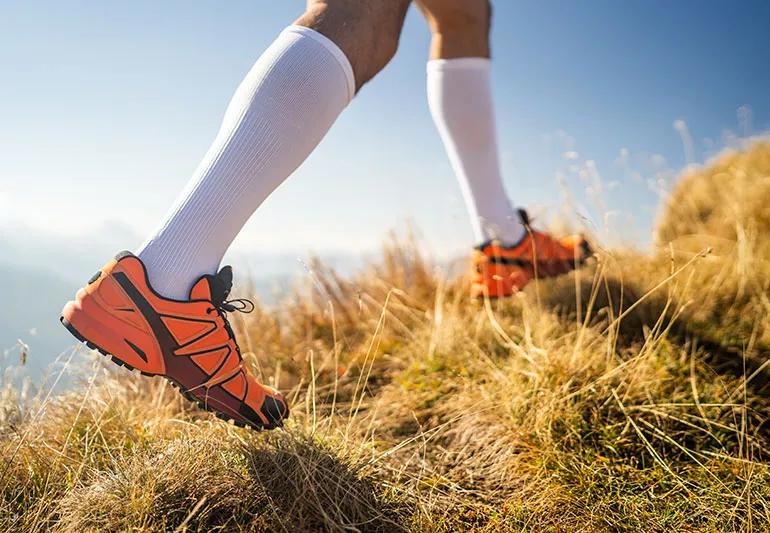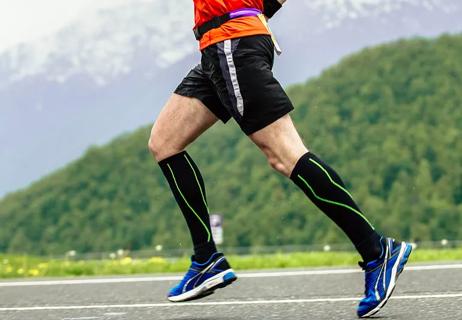Find out if you can benefit from a 24/7 squeeze.

Your great grandmother would never have believed it: Compression socks have become trendy. The leg-squeezing socks are helpful for people with vein problems, long-distance travelers and even athletes.
Advertisement
Cleveland Clinic is a non-profit academic medical center. Advertising on our site helps support our mission. We do not endorse non-Cleveland Clinic products or services. Policy
Compression socks can reduce swelling, increase blood flow and may even help recovery after athletic activity. But should you sleep in them?
Cardiovascular specialist Douglas Joseph, DO, explains how compression socks work and when to wear them.
Compression socks or stockings gently squeeze your legs to aid in blood flow, like a helpful hug for your legs.
“Compression socks are most commonly used as a treatment for people with chronic venous insufficiency,” Dr. Joseph explains. In this condition, the valves in the veins don’t work as well as they should. Blood has trouble getting back up to the heart, causing swelling, aching and heaviness in the legs.
By squeezing your calves, compression socks counteract the increased pressure in the veins, Dr. Joseph says. That helps blood flow back toward your heart.
The socks work for people without vein problems, too. Compression socks can reduce leg swelling in people who are on their feet all day or sitting for hours (like on a long flight).
Can you boost the benefit of compression socks by wearing them day and night? Dr. Joseph says it’s not necessary. “The benefit occurs when you’re up and moving, and gravity is working on your veins,” he says. “When you’re lying down, you take away the effect of gravity. So there’s no reason to wear compression socks when lying down or sleeping.”
Advertisement
Compression socks shouldn’t be uncomfortably tight. Still, it feels good to take them off and give your legs a break. Wearing them 24/7 could also be hard on your skin. Nighttime is a good time to peel them off, rub in some lotion and let your skin breathe.
But it’s not necessarily harmful to wear compression garments while you’re sleeping, especially for short periods. It’s no problem to leave them on for a nap, for example, if you don’t want to wiggle out of them before you doze and pull them on again after.
In recent years, compression socks or sleeves — often called “recover socks” — have become popular among runners and athletes. Some research has shown that using them during a run can increase performance the next time you hit the pavement.
Would wearing them after a workout — or even all night — boost recovery even more?
In this case, “recovery” doesn’t refer to what happens after you stop exercising. “They’re called recovery socks because they improve circulation to help your muscles recover more quickly during an activity,” Dr. Joseph says. “The effect comes while you exercise, so there’s no reason to keep them on afterward or while you sleep.”
There’s one exception to the “don’t need compression at night” rule, Dr. Joseph says. “People with vein disease may develop open sores on their legs. Wearing compression socks at night can help them heal.”
For such medical uses, talk to your health care provider about when to wear compression socks and the right level of tightness. For athletes or people looking to ease leg swelling from sitting or standing, over-the-counter options abound. They come in an amazing variety of styles for daytime use.
“You can find different fabrics, thicknesses and designs — from argyle and stripes to trouser socks or sheer stockings you can wear with business attire,” Dr. Joseph says.
Advertisement

Sign up for our Health Essentials emails for expert guidance on nutrition, fitness, sleep, skin care and more.
Learn more about our editorial process.
Advertisement

Safe to wear for most people, compression socks promote better blood circulation in your legs

To avoid sleep deprivation and shift work sleep disorder, try adopting habits that minimize light exposure and prioritize daytime sleep

It’s an emergency if the pain doesn’t go away, gets worse or you have other worrying symptoms

Sleep disorders, mental health conditions and other health concerns can all affect the quality of your sleep

Most people fall asleep within 10 to 20 minutes, but if your experience is different, adjusting your sleep schedule may help

Your diet in the weeks, days and hours ahead of your race can power you to the finish line

You can improve your athletic performance over time by breaking up your workout regimen into focused cycles

Start training with full-body workouts at least six to eight weeks before you hit the slopes

Even small moments of time outdoors can help reduce stress, boost mood and restore a sense of calm

A correct prescription helps your eyes see clearly — but as natural changes occur, you may need stronger or different eyeglasses

Both are medical emergencies, but they are very distinct events with different causes